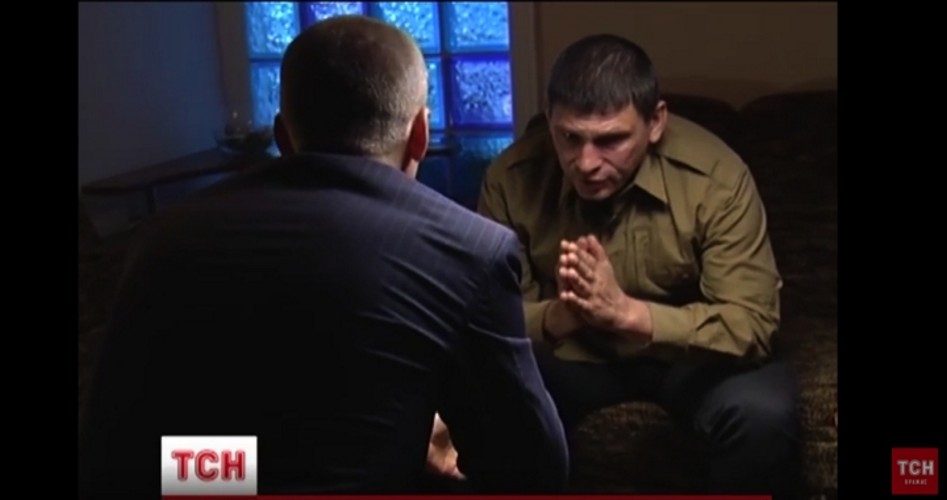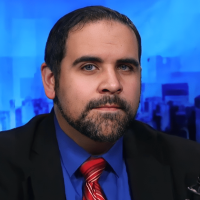
On December 6, 2015, in a televised interview with the Ukrainian news program ТСН Тиждень (TSN Tyzhden, Ukrainian for TSN Weekly), a former FSB officer admitted that Russia is behind ISIS while ostensibly opposing it.
Former FSB officer codenamed “Yevgeniy” (shown, back toward camera) revealed that Russia’s FSB security services was, at the very least, complicit in the Paris attacks carried out by ISIS, and most shockingly that the FSB was involved in the creation of ISIS, which it influences through its agents who staff it as well as other related Islamic terrorist organizations.
The FSB, which stands for Federal Security Service in Russian, was organized in 1995 as the successor to the Soviet KGB. After the KGB was officially dissolved in 1991, it was briefly renamed the AFB (Agency for Federal Security), which was reorganized that same year as the MB (Ministry of Security). In 1993, the MB became the FSK (Federal Counter-Intelligence Service), which was again reorganized into its present form and name as the FSB on April 12, 1995.
Yevgeniy reportedly specialized in both terrorist organizations and counter-terrorism activities within the FSB. Defecting for personal reasons rather than ideological, Yevgeniy told TSN’s Andriy Tsaplienko that among the vast number of refugees entering Europe were certain Russian operatives whose task it was to infiltrate the Muslim communities. Financed by the FSB, these undercover Muslim operatives would rise to prominence within their respective communities, in turn providing the Kremlin with valuable intelligence of Muslim activates in Europe and allowing Moscow to exert influence over the communities.
“Being guided by good intentions, human rights activists from Europe would help the people being persecuted in their country to flee. Among them were infiltrators with ready documents and a made-up legend. They would actively infiltrate into Muslim communities. With the support of the security services, they made financial donations, thus acquiring prestige and moving up the hierarchy,” Yevgeniy said.
Regarding the Paris attacks, Tsaplienko asked, “Is there any proof which suggests that the Russian special services were involved in the terrorist attacks on Paris, or at least they knew about them in advance?”
Yevgeniy replied, “Given the connections they have in Muslim communities based in Europe, they could not but know that the terrorist acts were being prepared. They knew but did not share.”
Tsaplienko interrupted with a follow-up question, “Is it complicity?”
“It is complicity in acts of terrorism. And the complicity could be direct or indirect. By analyzing their connections, one, of course, will be able to see the ties leading to Russia. Primarily Russia could benefit from this, and the Russian security services had all the possibilities to organize this,” Yevgeniy responded.
In other words, at the very least there was no way that Russia could not have known of the attacks in advance considering the FSB’s active presence within the Muslim communities throughout Europe. The high probability that Russia knew of the attacks in advance but yet did not warn proper European and French authorities, Yevgeniy suggests, is indicative that Russia wanted the Paris terrorist attacks to occur or at the very least was okay with them happening.
Anatoliy Golitsyn, a high-ranking KGB defector who served in the KGB’s ultra secretive long-range disinformation Department D, explained in his book New Lies For Old (1984) the then-Soviet Union’s reason for sponsoring terrorism:
The objective of violence is to create chaos and anarchy, to impose additional strains on ruling democratic parties, to eliminate their ablest leaders, to force them to resort to undemocratic measures, and to demonstrate to the public their inability to maintain law and order, leaving the field open to the legal communist party to present itself as the only effective alternative force.
Although Russia no longer outwardly projects a communist, Marxist-Leninist ideology, KGB/FSB defector Konstantin Preobrazhensky states on page 21 of his book KGB/FSB’s New Trojan Horse: Americans of Russian Descent (2008), “The FSB and the Communist Party share the same ideas.” Preobrazhensky notes, “In Soviet times, chekists [name given to KGB officers after the organization’s original predecessor the ‘Cheka’] proudly called themselves ‘the armed unit of the Communist Party.” (Emphasis in original.) Preobrazhensky further writes, “the chekists even now remain Communists in their hearts.”
Furthermore, current Russian President Vladimir Putin joined the KGB in 1975, and was stationed as an officer in communist East Germany from 1985 to 1990 before resigning with the rank of lieutenant colonel in 1991. In 1998, then-Russian President Boris Yeltsin appointed Putin as FSB director, which he served as until March 29, 1999, shortly before becoming president of Russia on December 31, 1999. On April 25, 2005, in his annual address to the Federal Assembly at the Kremlin, President Putin said, “First and foremost it is worth acknowledging that the demise of the Soviet Union was the greatest geopolitical catastrophe of the century.”
Run by a chekist president who regards the collapse of the Soviet Union as the “greatest geopolitical catastrophe” of the 20th century, it is understandable how, as Yevgeniy said, “Russia could benefit” from the Paris attacks.
Tsaplienko also asked Yevgeniy if he could “name any Russian agents in the Muslim structures, give the names of the people who get money to destabilize the situation from time to time?”
“A son and two nephews of Hezbollah’s security chief. Once they lived in Moscow, now they’re residing in Europe, and the SVR manages the Arab-Lebanese cell through them,” answered Yevgeniy.
According to TSN, it found out that Yevgeniy was referring to the relatives of Abdul Hadi Hamadi, Hezbollah’s head of counterintelligence. The Russian Federation does not recognize Hezbollah as a terrorist organization.
The SVR is Russia’s official Foreign Intelligence Service, which, like the FSB, is an offshoot of the former Soviet KGB.
Regarding ISIS, Tsaplienko asked, “Can one claim that Russia, the Russian special services are involved in the creation of ISIS?”
“Definitely, and I know that exactly, the Russian special services believed that if a terrorist organization was set up as an alternative to Al-Qaeda and it created problems for the United States as [the heavily ethnic-Russian populated region of Ukraine known as the] Donbas does for Ukraine now, it would be quite good,” Yevgeniy said.
In an attempt to verify his claims, Ukrainian experts twice checked his statements with a polygraph test. The results apparently revealed that Yevgeniy’s testimony is truthful.
As for his claim that radical Islamist groups are staffed with Russian agents, during the White House Summit on Countering Violent Extremism (February 18-20), FSB Director Alexander Bortnikov made the surprising announcement that 1,700 Russian citizens were in Iraq fighting for ISIS. “At present there are 1,700 Russian citizens in Iraq and this number has practically doubled since last year,” Bortnikov said.
Since Bortnikov’s announcement earlier this year, the number of Russians and former Soviet bloc citizens who have joined to fight for ISIS has dramatically increased to around 7,000. On October 16, 2015, speaking at the Commonwealth of Independent States (CIS) Council of Heads of State, Putin said, “There are an estimated 5,000 to 7,000 fighters from Russia and other CIS member states fighting for ISIL.” (ISIL is an alternate acronym for ISIS).
Given Russia and the FSB’s past history regarding international terrorism, supposed “Chechen” terrorism, and the revelations by the late-FSB defector Alexander Litvinenko that al-Qaeda leader Ayman al-Zawahiri was trained at an FSB base in Dagestan in 1998, Yevgeniy’s revelations of a Russian FSB role in both ISIS and in particular and “Muslim” terrorism in general should be taken seriously and not simply dismissed. In the words of former General Secretary of the Communist Party of the Soviet Union Leonid Brezhnev, “The banner of Islam may lead into [the] struggle for liberation.” With the FSB reportedly behind ISIS and infiltrating Europe’s Muslim communities, it would appear that Brezhnev’s “struggle for liberation” has arrived.
Image: screenshot from YouTube video of TSN Tyzhden host Andriy Tsaplienko interviewing FSB defector “Yevgeniy” (back toward camera)





